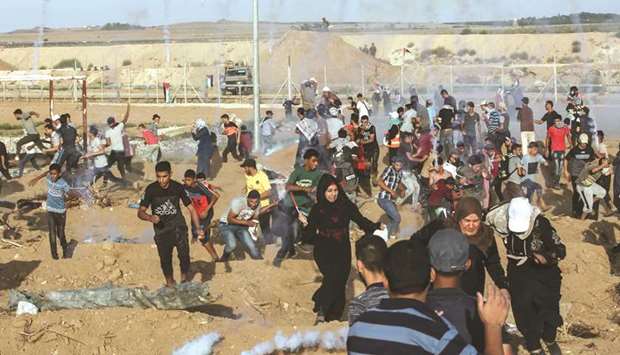The move threatens the existence of the cash-strapped PA and amounts to “theft”, said Saeb Erekat, secretary general of the Palestine Liberation Organisation.
Both he and a spokesman for Palestinian president Mahmoud Abbas called it a “dangerous decision”. The legislation was approved late Monday and gives the Israeli government powers to withhold an amount of money based on what is paid to the prisoners and their families by the PA.
Israel collects around $127mn a month in customs duties levied on goods destined for Palestinian markets that transit through Israeli ports, and then transfers it to the PA.
“This is a very dangerous decision that amounts to the cancellation of the Palestinian Authority and is piracy and theft,” Erekat said.
“Israel is stealing the land and money of the Palestinian people, and that is a result of the decisions of (US) President (Donald) Trump, who supports Israel.”
Abbas spokesman Nabil Abu Rudeina said the Palestinian leadership was planning a response to the move, which he said would cross “one of the red lines” if implemented.
According to a sponsor of the legislation, the PA pays around $330mn a year to prisoners and their families, accounting for 7% of its budget. Israeli Defence Minister Avigdor Lieberman hailed the new law, saying: “Every shekel Mahmoud Abbas will pay for fighters will be automatically withdrawn from the Palestinian Authority’s budget.”
US legislation that became law in March also withholds some aid to the Palestinian leadership over the payments to prisoners’ families and the families of those killed while carrying out attacks.
The law, known as the “Taylor Force Act”, is named after a US military veteran and graduate student who was killed in a 2016 attack while he was visiting Israel.
Israel argues that payments to the families of Palestinians jailed for security offences or killed by Israeli forces while carrying out attacks encourage further violence.
Many Palestinians view the prisoners and those killed while carrying out attacks as heroes or “martyrs” in the struggle against Israeli occupation.
The payments can be a key source of income for families, who have in many cases lost their main breadwinner.
Abbas would face heavy pressure among Palestinians if he would move to cut the payments.
Palestinian officials say some 850,000 people have spent time in Israeli prisons in the 50 years since Israel seized the Palestinian territories in the 1967 Six-Day War.
Israel currently detains some 6,500 Palestinians for a range of offences and alleged crimes.
The Jewish state has withheld payments to the PA in the past, notably in response to the Palestinians’ 2011 admission to the UN cultural agency Unesco as a full member.
The PA, which has limited sovereignty in parts of the occupied West Bank, relies heavily on outside financial aid.
It is also facing what is sees as blatant bias from Trump’s administration and froze relations with the White House after he recognised Jerusalem as Israel’s capital last year.
But while the prisoner payments have sparked outrage in Israel and elsewhere, Israeli authorities also benefit from security co-ordination with the PA and may be reluctant to see financial cuts that significantly affect that.
Abbas’ secular Fatah movement dominates the West Bank-based PA, while his rivals Hamas control the Gaza Strip.
WOMEN RALLY ON BORDER
Meanwhile, thousands of Palestinian women demonstrated yesterday along the fence that separates the Gaza Strip from Israel, their first mass mobilisation since protests erupted on the border three months ago.
Since the end of March, Gazans have been demonstrating along the heavily guarded frontier in protest at Israel’s decade-long blockade of the territory and in support of the Palestinians’ right to return to lands they fled or were driven from during the war surrounding the creation of Israel in 1948. Yesterday, women arrived in buses from across the enclave, many accompanied by their children, AFP correspondents said.
They moved in groups to within 50 metres of the fence that divides the Gaza Strip from Israeli territory, they reported.
Seventeen people were wounded by Israeli gunfire, Gaza’s health ministry spokesman Ashraf al-Qodra said.
“I came to finish the march that my daughter had started,” Rim Abu Irmana said, waving a picture of her 15-year-old daughter, Wasal, who was killed by Israeli gunfire on May 14.
“These demonstrations are peaceful. We are only defending our land and our rights,” added the 43-year-old, holding the hand of her young son.

